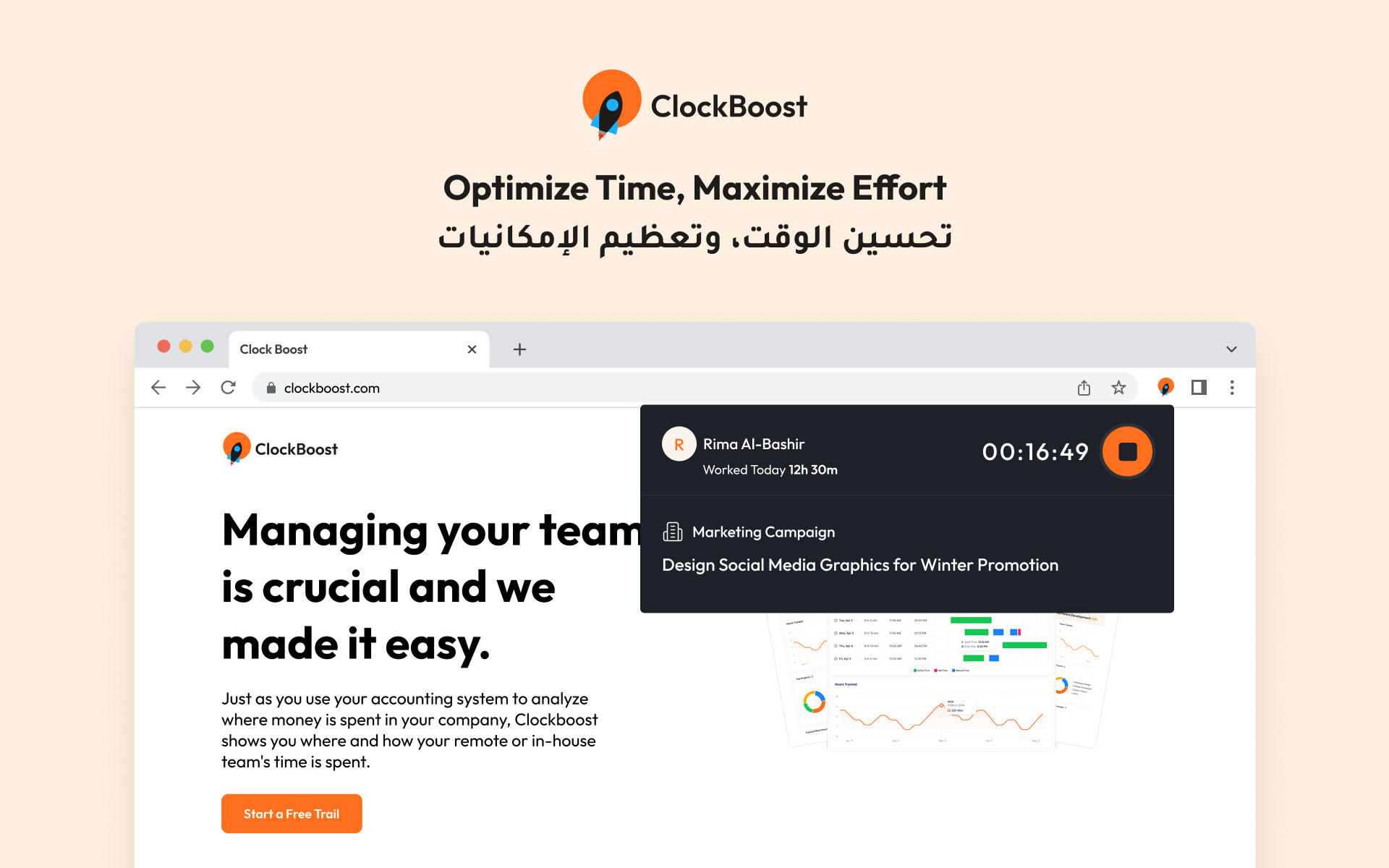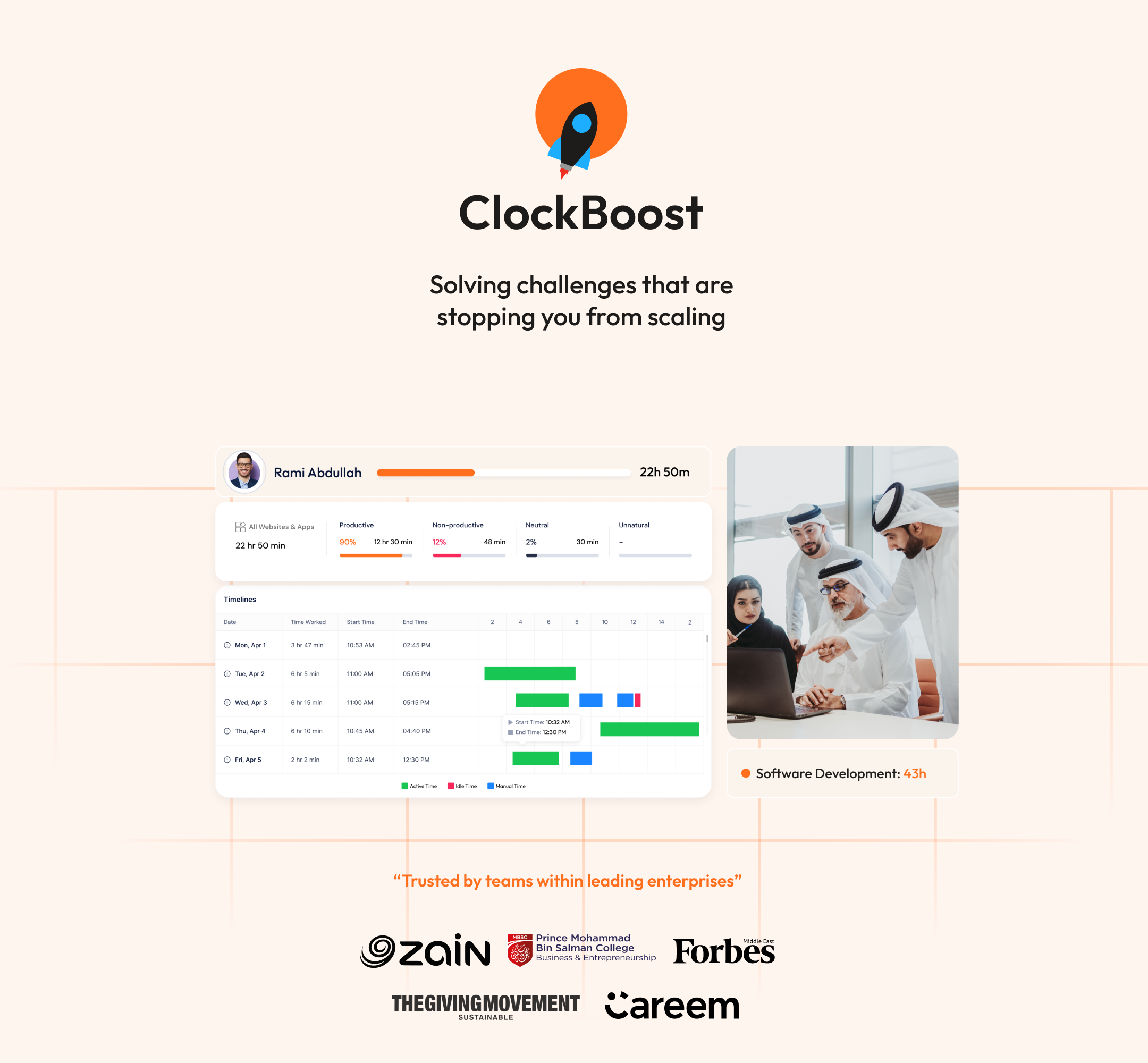
Post-Summer Work Reboot: Balancing Flexibility and Productivity for Gulf Tech Teams
The summer slowdown across the Gulf is no secret. Between long vacations, high temperatures, and shifting team availability, July and August often feel like a holding pattern for tech companies across the UAE, Saudi Arabia, and the wider GCC. But September brings a new rhythm, a chance to refocus, re-engage, and reboot remote team productivity for the rest of the year.
For tech leaders and HR managers overseeing hybrid and remote teams, this transition isn’t just about getting “back to work.” It’s about rebuilding smarter, balancing flexibility with productivity in a way that aligns with Gulf work culture, employee expectations, and operational goals.
And this is where tools like ClockBoost step in not just as a time tracker, but as a post-summer productivity partner.
Understanding the Summer Slowdown in Gulf Work Culture
Let’s start with what everyone already knows but rarely plans for.
Summer in the GCC is a unique operational season. School holidays, annual leaves, and the extreme heat all combine to disrupt daily rhythms. Government institutions in Dubai have responded proactively, with the "Our Flexible Summer" initiative offering four-day workweeks and shorter Fridays to public sector workers from July to September.
This isn’t just about comfort, it’s a clear recognition that traditional work patterns don’t fit every season. For private sector tech teams, the lesson is clear: productivity is seasonal, and that’s okay.
The question is what happens next?
Flexibility Without Chaos: The New Hybrid Norm
The word on every HR leader’s radar right now is flexibility. But let’s be clear: flexibility doesn’t mean a free-for-all. It means giving teams autonomy, while maintaining structure and alignment.
In Gulf-based tech teams, that often looks like:
- Shifting meeting hours to align with global teams
- Adapting schedules for prayer times or family needs
- Balancing in-office collaboration with remote deep work
This is exactly where ClockBoost becomes crucial. It offers:
- Automatic time tracking that works whether your team is online or offline
- Privacy-first screenshots (optional and role-based)
- Idle-time detection to surface focus patterns not just hours worked
The result? Leaders gain visibility, teams maintain autonomy, and productivity becomes measurable again, even in highly flexible environments.
Data-Driven Reboot Strategies for Tech Teams
Before you relaunch goals or push harder on deliverables, you need a clear picture of where your team actually stands.
Start with a post-summer audit:
- Are your team members logging fewer hours or just working at different times?
- Has idle time increased?
- Are key projects slipping, or are they simply paused due to vacations?
ClockBoost’s dashboards give you this visibility in real time without the need for manual check-ins or status meetings.
Once you’ve diagnosed your team’s current performance, you can begin to reset KPIs:
- Recalibrate Q4 goals to account for the summer dip
- Adjust expectations for part-time or returning team members
- Use ClockBoost’s data to align time tracking with real business outcomes, not just activity
This approach gives your reset real teeth because it’s based on team behavior, not guesswork.
Re-Engage and Re-Onboard Your Remote Team
You don’t need a formal onboarding process every September, but a light-touch reset can go a long way in rebuilding momentum.
Here’s what we recommend:
- Reintroduce tools like ClockBoost: Remind teams how to use the browser extension, customize reminders, or set personal productivity targets
- Sync calendars and availability: Especially across multiple time zones or countries
- Revisit shared goals: Bring everyone back to the “why” behind the work
ClockBoost can help streamline this by offering personalized dashboards and analytics summaries that show each employee how they’re contributing—and where they can optimize.
It’s transparency without micromanagement. And that’s the foundation of re-engagement.
Leadership and Trust in a Flexible Gulf Workplace
Gulf-based companies are redefining leadership in the remote era. According to a 2025 Middle East survey by Kestria, over 44% of organizations now operate in a hybrid model, with flexibility, empathy, and communication emerging as key leadership traits.
What does this mean for post-summer productivity?
It means:
- Leaders must focus more on outcomes than on activity
- Trust is built through clarity and visibility, not control
- Tools like ClockBoost support this by giving both managers and employees a shared view of time, goals, and progress
No one wants surveillance software. What they want is insight, and that’s exactly what ClockBoost delivers, with features tailored to Gulf-region data norms and employee privacy standards (PDPL).
Mini Case Study: What We Can Learn from Dubai’s 4-Day Week
In just a few months, Dubai’s summer policy has shown that shorter weeks don’t reduce productivity; they increase it.
Imagine applying that insight across your own tech team:
- Could you experiment with async Fridays or no-meeting Mondays?
- Could you shift schedules to accommodate energy levels or team preferences?
- Could ClockBoost help you track whether these changes actually work?
Yes, yes, and yes.
With the right visibility, even radical flexibility becomes manageable—and measurable.
Conclusion: Don’t Just Reset, Rebuild Smarter
The post-summer reboot isn’t just a tactical adjustment. It’s a strategic opportunity to align your team, your tools, and your time with the way modern Gulf teams actually work.
ClockBoost helps you:
- Measure productivity without spying
- Align flexible policies with real performance
- Reset goals using real data, not gut feel
So this September, don’t just push your team to bounce back. Help them rebuild better.
Start your 3-month free trial of ClockBoost, no credit card, no pressure. Just clarity, accountability, and smarter remote productivity for your Gulf team.


























.png)

